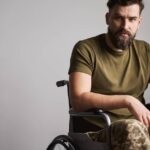VA SMC, or Special Monthly Compensation, is an additional benefit available to veterans whose service-connected conditions are so serious that standard VA disability ratings don’t fully cover their needs. It provides extra, tax-free financial support for veterans who have lost vital functions, need daily caregiving assistance, or face limitations that prevent independent living.
Think of VA SMC as the VA’s way of recognizing that some disabilities create extra challenges in everyday life. A veteran who cannot dress without help, a veteran who has lost their eyesight, or a veteran who requires 24-hour care all face hardships that go beyond the “average” disability. SMC is designed to provide extra resources for those circumstances.
To understand what qualifies for VA SMC, it helps to look at the different levels of compensation the VA recognizes. Each level applies to specific circumstances:
SMC-K: Loss of Use or Amputation
SMC-K is one of the most common forms of special compensation. Veterans qualify if they’ve lost, or lost the use of, certain body parts or bodily functions. This might include:
- Amputation of an arm, hand, leg, or foot
- Permanent loss of eyesight or hearing
- Loss of speech due to a service-connected condition
- Loss of reproductive organs or their function
For example, a veteran who loses hearing in both ears as a result of combat-related injury could qualify for SMC-K. Similarly, someone who loses the use of one hand due to nerve damage would be eligible, even if the hand is physically intact but no longer functional.
What makes SMC-K unique is that it’s considered an “add-on” benefit. That means you receive it in addition to any other disability compensation you already qualify for.
SMC-L: Aid and Attendance
SMC-L is awarded when a veteran needs help with basic daily activities. These are the tasks most people take for granted—bathing, dressing, eating, or moving safely around the home.
For instance, a veteran with advanced multiple sclerosis who cannot get out of bed without assistance may qualify for SMC-L. The same applies to someone whose spinal cord injury leaves them unable to transfer from a wheelchair without help.
Veterans can also qualify under this level if they are permanently bedridden. The purpose of SMC-L is to acknowledge the extra burden of needing another person’s assistance every single day.
SMC-S: Housebound
Some veterans are essentially confined to their homes because of their service-connected conditions. SMC-S provides additional compensation for those who are housebound.
To qualify, a veteran must have:
- One service-connected disability rated at 100%, and
- Other service-connected disabilities totaling 60% or more, separate from the first.
Imagine a veteran who has a 100% rating for PTSD and also has severe arthritis and migraines adding up to 60%. If these conditions prevent them from leaving home for work, shopping, or even family events, they may qualify for SMC-S.
This level is meant to recognize that being housebound creates social isolation and limits a veteran’s independence in a way that goes beyond the standard rating system.
SMC-R: Higher Levels of Aid and Attendance
For veterans with the most severe disabilities, there are higher levels of aid and attendance benefits. These are broken down into two categories:
- R1: For veterans who need daily, in-home assistance. This might include help from a spouse or adult child who provides meals, ensures medications are taken, and helps with personal care.
- R2: For veterans who require professional medical care from a nurse or licensed healthcare provider. For example, a veteran with a severe spinal cord injury who needs regular catheter care or wound treatment may qualify for R2.
The difference between R1 and R2 comes down to the type of care required. If daily help is enough, R1 may apply. If skilled medical knowledge is necessary, R2 may be appropriate.
SMC-T: Traumatic Brain Injury
Veterans with severe, service-connected traumatic brain injuries (TBIs) may qualify for SMC-T. This benefit applies when continuous supervision or institutional care is required because of the TBI.
For example, a veteran who sustained a severe TBI in a blast and now needs constant monitoring to prevent harm might qualify. If a family caregiver can’t safely meet those needs and professional medical oversight is required, the VA may grant SMC-T, which pays at the same rate as R2.
Intermediate Levels (M through O)
Not every case fits neatly into K, L, S, R, or T. That’s why the VA also has intermediate levels of compensation—SMC-M through SMC-O. These are designed for veterans with profound impairments like total blindness or total deafness, especially when combined with other serious disabilities.
For instance, a veteran who is completely blind and also lost the use of one arm may qualify at one of these intermediate levels. These categories acknowledge that some combinations of disabilities create hardships that are greater than the sum of their parts.
Beyond the 100% Rating
A final point worth emphasizing: VA SMC can apply even when a veteran already has a 100% disability rating. Many people assume that once they hit 100%, that’s the end of the road. But SMC recognizes that some veterans face even greater challenges.
Consider a veteran who has a 100% rating for lung disease but also requires assistance with daily living because of paralysis. The standard 100% rating doesn’t account for the full impact of those combined conditions. SMC steps in to provide additional support.
Talk to a VA-Accredited Lawyer for FREE
Determining whether you qualify for VA SMC isn’t always simple. The VA-accredited disability attorneys at VetLaw understand the SMC system and have years of experience building strong claims. We’ll help identify which level fits your situation and make sure your case is backed by the right documentation.
You don’t need to go through this alone. Contact VetLaw today online or at (336) 355-8387 for a FREE case evaluation.







